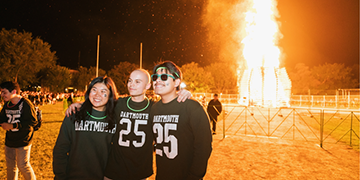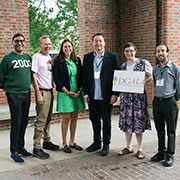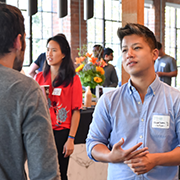Sophomore Summer Pilot Program Connects Values with Career Planning
The Dartmouth Center for Career Design helps students use design thinking to chart meaningful career paths.

Aug 8, 2025
5 minute read
James Bressor
5 minute read
Eighteen Dartmouth sophomores are participating in a summer-term pilot program that harnesses design thinking to explore fulfilling career paths.
In classroom sessions guided by the Dartmouth Center for Career Design’s coaching team, students have learned to apply design thinking principles to their career planning. These principles, developed at Stanford, provide a structured approach that gives students a richer understanding of their values and what career paths may be most meaningful to them. As part of the course, students are engaging in multiple hands-on projects for nonprofit organizations through the end of August.
“That kind of intentional reflection doesn’t always happen during the school year, so it’s been really refreshing,” says Kate Ginger ’27. “It has also been exciting to take those insights and apply them through my work with an organization in the Upper Valley. I feel like I’m not just thinking about jobs. I’m thinking about how to build a life that feels meaningful.”
At the conclusion of the Sophomore Summer Career & Life Design Program, each student will receive a personal career success plan containing specific strategies for continued personal and professional growth.
“We want to equip students with skills that will help them navigate the big decisions in their lives,” says Joe Catrino, the center’s executive director.

The Dartmouth Center for Career Design, launched in May, ambitiously seeks to bring all the College’s career planning services under one roof—one-on-one coaching, internship opportunities, career fairs, and more. Dartmouth is actively fundraising to support the center through endowed giving, which will provide permanent funding and ensure the center’s ongoing holistic approach toward personal growth and career success.
The center emphasizes a life-design approach to career planning. Life design is built on design thinking principles, which encourage individuals to understand themselves more fully, brainstorm options to address a specific challenge, and then build and test options.
“The idea is you start with empathy, and whether you’re solving a problem for someone else or for yourself, design thinking develops self-reflection and a deeper understanding of who you are,” Catrino says. “When many students get to thinking about their career, they don’t really know who they are. They don’t know their values, their worldview, their work view. They’re not thinking about the values that are important to them in the workforce.
“Design thinking helps students find meaning and purpose in their work. In the lecture part of the summer program, we’ve exposed students to these different steps in the life-design process so they can understand themselves and brainstorm possible career designs for themselves.”
Assistant Director Chris Jordan, who oversaw development of the curriculum and has led several classroom sessions, says nearly every participating student expressed anxiety about the career-planning process at the beginning of the program.
“For many of them, it felt like an overwhelming question: ‘What am I going to do after Dartmouth?’” Jordan says. One factor driving that anxiety is students’ tendency to consider only a narrow range of career options, often based on what their peers have done. There is, he says, “a kind of campus bubble” that highlights a small number of careers.

“The design-your-life framework is an empowering way to break down the big question of career development into manageable pieces, enabling students to reflect on what’s important to them individually,” he adds. “This course is intended to provide a space, with useful strategies and tools, to generate broader career ideas, and then see how they might test the waters.”
During the second half of the non-credit program, students are gaining firsthand experience applying design thinking principles. Working in teams of two or three, they are tackling discrete projects at one of eight participating nonprofits located in Vermont, New Hampshire, and beyond. Each project should require approximately 30 hours of work.
“It’s an important step in the process of career planning to provide students with these opportunities to apply the skills that they’re learning in the classroom in a real-world setting,” says Anne Lyford, the center’s associate director, who leads the employer relations team.
Examples of projects include creating a board game for Make-a-Wish New Hampshire and developing an AI chatbot for Foster Nation, an organization that helps young adults become more self-sufficient after foster care.
Jordan says he and his colleagues expect most of the students in the summer program to stay in touch with the center through the next two years.
“We are hoping these students come back and see us as their insight evolves,” he says. “We’re setting these students up for a continual engagement that can be supported through coaching and programming.”
Catrino says if the pilot program proves successful, the center will look to expand it during future Sophomore Summers while exploring the possibility of offering it during other terms. The center will survey all students and nonprofit organizations to gather insights into how the program can be improved and possibly expanded.






